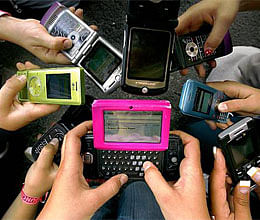
The mere presence of a cellphone can affect your conversation with people even if it never rings or vibrates, a new study has found.
Mobile phones don't disrupt casual conversation much but when people were asked to discuss something meaningful, they reported less trust, empathy and lower relationship quality when a cellphone was in the room, the study has found.
The presence of a mobile phone can also make a meeting between two strangers more stilted, 'LiveScience' reported.
"What the work does is highlights one potential downside to mobile phones being so ubiquitous," said study researcher Andrew Przybylski, a psychologist at the University of Essex.
Przybylski got the inspiration for the study after noticing daters and bar-goers in Manhattan leaving their phones out on the bar or table.
He wondered how the phone's presence might be influencing face-to-face interactions.
He and his University of Essex colleague Netta Weinstein designed two simple experiments in which two strangers were told to talk for 10 minutes.
In the first scenario, 74 undergraduates were paired up and asked to talk about an interesting event in the last month.
Some of them happened to have this conversation in a room with a mobile phone sitting unobtrusively on a nearby table. For others, the mobile phone was replaced by a black notebook.
A second experiment used the same setup with 68 students. This time, some of the students were told to have a casual conversation about how they felt about Christmas trees.
Others were asked to discuss the most meaningful event of the year. Again, some participants had the conversation in the presence of a cell phone and others did not.
Even though the phone never rang or vibrated, it affected the conversation, Przybylski said.
"When people were having an important conversation, relationship quality was lower, and partner trust was lower and empathy was lower when the mobile phone was there," he told the website.
The effect was noticeable even though the participants barely noticed the phone. Surveys given after the experiment suggested the students had no idea the research involved the phone, and most had to be prompted to report they'd even seen it.
Przybylski doesn't see the research as condemning smartphones - plenty of studies find that technology does connect people, he said, particularly people who would otherwise fall out of touch due to distance.
The study was published in the Journal of Social and Personal Relationships.
Mobile phones don't disrupt casual conversation much but when people were asked to discuss something meaningful, they reported less trust, empathy and lower relationship quality when a cellphone was in the room, the study has found.
The presence of a mobile phone can also make a meeting between two strangers more stilted, 'LiveScience' reported.
"What the work does is highlights one potential downside to mobile phones being so ubiquitous," said study researcher Andrew Przybylski, a psychologist at the University of Essex.
Przybylski got the inspiration for the study after noticing daters and bar-goers in Manhattan leaving their phones out on the bar or table.
He wondered how the phone's presence might be influencing face-to-face interactions.
He and his University of Essex colleague Netta Weinstein designed two simple experiments in which two strangers were told to talk for 10 minutes.
In the first scenario, 74 undergraduates were paired up and asked to talk about an interesting event in the last month.
Some of them happened to have this conversation in a room with a mobile phone sitting unobtrusively on a nearby table. For others, the mobile phone was replaced by a black notebook.
A second experiment used the same setup with 68 students. This time, some of the students were told to have a casual conversation about how they felt about Christmas trees.
Others were asked to discuss the most meaningful event of the year. Again, some participants had the conversation in the presence of a cell phone and others did not.
Even though the phone never rang or vibrated, it affected the conversation, Przybylski said.
"When people were having an important conversation, relationship quality was lower, and partner trust was lower and empathy was lower when the mobile phone was there," he told the website.
The effect was noticeable even though the participants barely noticed the phone. Surveys given after the experiment suggested the students had no idea the research involved the phone, and most had to be prompted to report they'd even seen it.
Przybylski doesn't see the research as condemning smartphones - plenty of studies find that technology does connect people, he said, particularly people who would otherwise fall out of touch due to distance.
The study was published in the Journal of Social and Personal Relationships.










